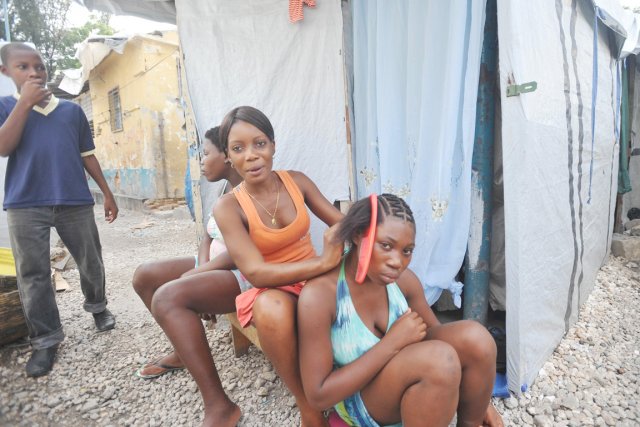This is a great opportunity, but also a challenge for a country such as Haiti. The potential tax revenues that could be generated from miningcopper, silver and gold are enormous. However, ensuring that a fair proportion of the revenue generated ends up benefiting the people of Haiti is far from a foregone conclusion.
The drive to attract the foreign investment needed to exploit these resources often leads governments to bow to pressure to negotiate deals that are far more favourable to the investors than they are to their own people.

In Bolivia, for instance, when trillions of cubic feet of gas reserves were discovered in the mid-1990s, the state industry was privatised. The rationale was that fresh capital was needed to exploit a greater volume of the reserves and thereby generate more tax revenue for state coffers.
The trouble was, the tax regime was so generous to the foreign investorsthat the country ended up losing revenue. The perceived government mismanagement of these valuable reserves was a significant factor in the violent protests ushering in several new presidents in Bolivia in the past decade – including today’s left-leaning Evo Morales.
The strength of popular protest was such that in 2005 the government was forced to negotiate a new royalty and tax regime. Previously a royalty of 18% was levied on most fields. A new tax called IDH (direct hydrocarbons tax) was brought in, which essentially functioned as a royalty and brought the tax liability up to 50%.
Royalties are generally a more effective form of taxation for developing countries with weak revenue administration systems because they are levied on the value of production rather than profits, which can be manipulated. It is much easier to obfuscate profits to limit tax liability than it is to hide actual production.
It is unusual for a developing country to levy a royalty as high as Bolivia’s. But gas is such a valuable commodity that there is some bargaining power if the government chooses to use it. Precious metals, by contrast, have less geopolitical significance – and governments have less room for manoeuvre when negotiating.
In Guatemala, the royalty rate for precious metals was recently raised to 4% from 1% of gross revenue. African mining concessions had negotiated even more favourable deals. Zambian copper mines were privatised in the 1990s, and so-called development agreements set royalty rates at only 0.6%. Pressure from civil society and churches prompted the government to pass a new law in 2008, raising the royalty to 3%. It also raised corporate income tax rates to 30% and introduced a windfall tax that would kick in when copper prices reached a certain level. President Michael Sata, who was elected in September last year, has now raised the mineral royalty rate to 6%.

In Haiti, the law states that there will be a 50-50 share of profits between the companies and the state. « On the face of it, this looks like a good deal for Haiti, » says Claire Kumar, Christian Aid’s economic justice expert for Latin America, « but there is a big question mark over whether this law will be applied in practice or whether individual companies will be able to negotiate exemptions in their contracts. »
Also, the recently negotiated royalty rate for precious metals in Haiti is only 2.5%. According to recent news reports, the rate is one of the lowest in the hemisphere. « Anything under 5% is just really ludicrous for a country like Haiti, » says Kumar, who published a report in 2009 looking at Latin American mining taxation. « You shouldn’t even consider it. For a country with a weak state, the royalty is the safest place to get your money. There is room for manipulation by the company, but it’s not as big as you would think. »
The experience of Liberia provides a cautionary tale. Its government negotiated a 30% profit tax for extracting iron ore, with royalties of between 3.25% and 4.5% depending on the quality of the ore and the size of the deposit. But a complaint has been lodged with the Organisation for Economic Co-operation and Development alleging that companies have been breaking international laws on bribery and that promised corporate social responsibility initiatives are not benefiting the public.
In Haiti, we will need to work hard to make the public aware of the mining exploration going on and the dangers to the environment it poses, so that people can put pressure on the government to negotiate hard to get the best deal. We will also need to be vigilant once the revenue starts to flow, to ensure it is well spent.
FREE T-SHIRT
with a $20 donation
Click here or mail your donation to :
Haiti Infos
P.O. Box 1428
Spring Valley,NY 10977
(For security,do not send cash by mail.
Check or money order only)
Join our circle at plus.google.com/haitiinfos
Send your articles, jokes, press releases and personal stories to
haitiinfos1804@gmail.com
When you advertise online,your message is being
seen 24 hours a day.It’s time to elevate your game by
launching your advertising campaign on one of the
most popular Haitian websites in the world,according to alexa.com
Come to think of it,If you’re not advertising on Haiti Infos,
we’re both losing money.For details
and rates, get in touch with us today at
haitiinfos1804@gmail.com

















.jpg)










































